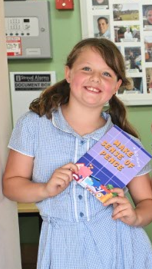The Origin of Make Sense of Pence
How One Conversation Sparked a Mission
Make Sense of Pence began with a simple conversation between me and my then-eight-year-old daughter, Olivia—Livvy for short. One day, she told me she’d lost £10 and assured me it was “only £10,” as if it were no big deal. For me, though, it was a wake-up call. Children often don’t grasp the value of money, and this made me realise just how important it is to help them understand. This was the spark that led to Make Sense of Pence, a project focused on teaching children about the concept of money and its significance in a way that resonates with them.
The idea didn’t take full shape until another moment with Livvy and her sister after their Saturday cheerleading session. They were excited to get a treat from the bakery, but I’d come out without cash, card, or phone. Livvy quickly ran through options, saying, “Can’t you just use your phone?” I was amazed by her awareness of payment methods but realised that her understanding of money was still forming.
“Livvy knew about digital payments but still didn’t fully understand what it means to have, or not have, money.”
Curious about financial education for young children, I visited Livvy’s school and asked about resources on money. Surprisingly, the library didn’t have any books specifically for teaching kids about money. Money was generally covered within maths but rarely touched on broader financial literacy concepts. Inspired, I decided to bridge that gap, starting with a book to introduce children to money and how it works.
In writing the first book, I thought back to my own financial journey, recalling moments of confusion or avoidance around money. From finding £5 as a child at the National History Museum and learning about paying with cash and getting a lesson about ‘change’ from my twin brother at the age of 8, to facing financial challenges as an adult, like when my mortgage changed from its fixed rate to the standard variable rate of interest – these experiences reminded me of how vital it is to understand money early on. I realised I’d been “writing” this book in my mind for years, drawn from my life’s lessons and mistakes.
In just two generations, we’ve gone from cash to cryptocurrency, and now even a fingerprint can pay for things—the world of money is changing fast.

The first book, Make Sense of Pence, aimed to introduce children to the basics: where money comes from, why it’s valuable, and how to manage it. Feedback from parents and teachers was overwhelmingly positive; they shared the sentiment that financial literacy was something lacking in education. Encouraged by this, we decided to expand the project. We developed Make ‘A Bit More’ Sense of Pence for slightly older readers, Hootini the Owl and the Money Quest for younger children, and a Make Sense of Pence Activity Book filled with interactive puzzles and games.
From there, the Money-Wise Workshop emerged. Initially, it was meant as a “kickstarter” session for schools, but the impact went beyond our expectations. Schools appreciated the workshop’s interactive format, which made financial topics engaging for students. By October 2024, we’d delivered 19 workshops to nearly 600 students across 11 schools.
The Money-Wise Workshop was intended as a simple introduction, but seeing the students’ engagement showed us the real impact we could make.
Make Sense of Pence continues to grow, with plans to reach more students and a vision of making financial literacy a part of every child’s education. What started as a conversation with my daughter has turned into a mission, and it’s been incredibly rewarding to see the impact on young learners. As we look to the future, we’re exploring partnerships and sponsorships to help bring these resources to more children, empowering the next generation with the knowledge and confidence to make informed financial decisions.
We’re excited about the journey ahead

It was a real pleasure to sponsor one of our local schools so that Make Sense of Pence could come in and teach the kids about money at such an early age. It’s such an important skill, and the program does a fantastic job making it accessible and fun. I also got my son the books, and after reading them, he really seemed to grasp how money works. He even got inspired to start his own small online business! Thank you for such a brilliant initiative—it’s making a real difference!